A Story of Yaqui Women
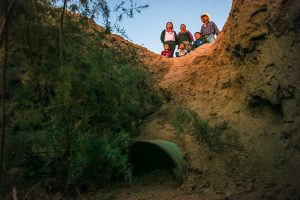
by Daliri Oropeza
The following article, translated from the Spanish version on Pie de Página, looks at the women-led struggle against the passing of a U.S. company’s gas pipeline through Yaqui territory in so-called Mexico. It also touches on the case of Yaqui political prisoner Fidencio Aldama, serving a 15+ year sentence related to resistance to the pipeline. For more information on Fidencio, visit fidencioaldama.org.
Text: Daliri Oropeza and Reyna Haydee Ramirez
Photos: Daliri Oropeza
The gas pipeline was already a foregone conclusion, at least that’s what the company, the subsidiary, and the government of Sonora thought. They were wrong. Yaqui women narrate how they have stopped this project.
Loma de Bácum, Sonora: A gigantic metal pipe can be seen at the bottom of a hole in the earth. The family of Carmen García look into the hole which was dug by the people of Loma de Bácum to remove the gas pipeline.
The people used an excavator they seized from the company IEnova, affiliate of the United States transnational, Sempra Energy. The company was building the gas pipeline without the approval of those who live there. A consultation was never carried out. So, after an assembly, the entire community went to where the pipeline was being laid. There, they excavated and cut out with a blowtorch nearly ten kilometers of pipeline, which they then took to Ciudad Obregón to sell as scrap metal.
“The company complained, made a fuss, and sued. If you continue building the pipeline, we told them, we are going to continue selling it as scrap metal,” says Guadalupe Maldonado Flores, a Yaqui who has accompanied territorial defense efforts of the traditional guard of Loma de Bácum.
In August 2017, they began to remove the pipeline, but the energy megaproject began in 2012, with the signing of a contract between the then-president Enrique Peña and the company. Construction began in 2013. They failed to carry out a consultation with the Indigenous peoples, yet they knew that the pipeline route crossed Yaqui territory.
The proposal was to build “Gasoducto Sonora” for the importation of gas through Agua Prieta. In 2016, the company arrived to the eight Yaqui towns to promote the project offering money, water purifiers, and even new pickup trucks. IEnova had the acceptance of seven of the eight Yaqui towns. In Loma de Bácum, it was impossible.
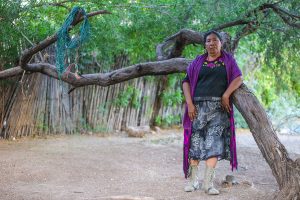
by Daliri Oropeza
Francisca Vazquez, Carmen’s mother, had a dream in the sacred Bakatete territory. After this dream, the women got organized. Casilda was still alive, a well-known Yaqui woman and elder, who dedicated herself to convene and organize the women in order to stop what the transnational company was doing. It was women who led the land defense.
“Ever since we were little, our ancestors, our grandparents, who never studied, who spoke our language, told us that our lands were going to be taken. ‘The government says: everyone will study. Don’t take their side. From today, you defend your territory. We are not going to be here anymore, and the day that the government wants, it will have you in its sights,’” says Francisca.
The reaction in the community when they were told about the gas pipeline was to ask what would happen if the pipeline exploded being so close to the inhabitants of the community.
“We remember the words of our ancestors, our grandparents, that we were going to lose our territories because our own Yaqui brothers were not going to denounce it.” Like that, women from at least four of the eight Yaqui towns began to organize at the invitation of Francisca’s close friend Casilda, who died in 2020 from cancer in the middle of the Covid-19 pandemic. Casilda was a woman dedicated to singing at the church in Loma de Bácum. She committed herself to the struggle against violence toward women, and was always an advocate for women’s rights.
Thanks to the work of the women’s group from Bácum, they won an injunction and the judge suspended construction in June 2017, also ordering the removal of the pipeline. But the company continued construction until the community of Loma de Bácum stopped it themselves.
Now, every October 21, they celebrate the most recent defense of territory. They prepare food for the entire community, and they also do the deer dance with traditional music. The goal is that this day of resistance sticks in the memory of the youth, of the children.
Also, to serve as a reminder of these acts of self-defense, the community left the burned cars which belonged to the pipeline company in the central plaza, in front of the church and traditional guard.
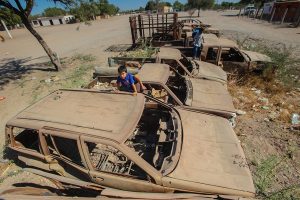
by Daliri Oropeza
According to an investigation from Avispa Midia, IEnova has investments of 8.769 billion US dollars in Mexico and a history of abuses. The company accused the Yaqui people of being a “criminal group” that carried out acts of “vandalism.”
Inhabitants of this town and of the other seven Yaqui towns are now denouncing the entrance of mining companies for exploration in their territory. The traditional guard of Loma de Bácum detected at least seven incursions in the mountains of Bakatete seeking to begin mining projects.
“We have always been alert; now even more so,” assured Guadalupe.
Freedom of a Political Prisoner
A week after the Yaqui community of Loma de Bácum stopped the machinery, a group of armed Yaquis, the majority from Loma de Guamúchil, entered the community to wreak havoc. Different testimonies say that the company paid them. The objective of the group was to come into town and replace the traditional authority that refused the gas pipeline, in order to impose an authority that would accept the megaproject.
The day that the violent group arrived in Loma de Bácum, there were many people in the community, more than 600. The group said that they came to dialogue, to have a meeting, says Francisca, a woman with a firm tone, wearing a purple shawl and a traditional Yaqui skirt, who takes care of her father who has diabetes. She appears younger than she is. She is a woman devoted to singing in the community church.
Carmen’s family recognizes that other communities accepted the route of the pipeline, but the traditional authorities didn’t consult with their respective people, to whom they are responsible. They only made a deal.
In Loma de Bácum, rather, the people and the traditional guard decided to defend Yaqui territory, both from mining as well as from the gas pipeline. Part of that work is strengthening their traditions, language, and productive activities.
But on October 21, 2016, there were gunshots. There were two attacks on the same day, in the first attack, Cruz Buitimea of Loma de Guamúchil died.
“There were women there, like my aunt,” says Carmen. “My aunt says that she was carrying sticks of firewood. She took them to the men so that they could defend themselves with the sticks and stones that she gathered in her blouse, because they didn’t have anything with which to defend themselves.” The violent group arrived armed, and Loma de Bácum defended itself in response, explains Carmen while drinking coffee with her family in the backyard of her house, where her two kids play and sing songs in the Jiaki language.
She says that when they came to attack for the second time that day was when they blamed Fidencio from Cruz Buitimea’s death. “He confidently told them: ‘If you think that I killed him, we will see how that plays out legally.’” Carmen accentuates, “And you see how corrupt this system is, this law, and this government.” At that moment, Fidencio was pushed up against a tree. They beat him. He ran. They chased him, but he managed to escape by hiding in the brush.
Fidencio is 32 years old. He is originally from Loma de Guamúchil, although he lives with his family in Loma de Bácum. He has served various roles in the community. He has openly spoken out against the gas pipeline.
When some of his relatives received money from the IEnova energy company, Fidencio said to them, “Why are you taking money if that money is going to eventually disappear in exchange for territory that will always be here, territory that is supposed to be ours. But if you are selling it, you are not going to have it for your families.”
“They said that it was my husband.” The two people that accused him presented a video where Fidencio is carrying a gun, the guns used by the community police of Loma de Bácum, which was Fidencio’s position at the time. The guns belonging to the traditional guard are .45 caliber. Different than the caliber of the bullet that was found in the deceased Cruz, which was a .22 caliber. This is not mentioned in the case file.
According to witnesses, on that day it was people from other Yaqui towns who violently entered the community alongside those from Loma de Guamúchil who murdered Cruz. “The idea was that there would need to be deaths in order to justify the entrance of the state, so that the police would enter,” Guadalupe Flores tells us as we take a tour of the agroecological garden of the Yaqui town.
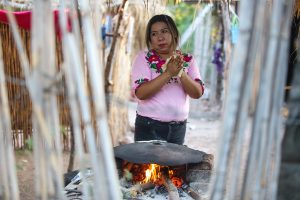
by Daliri Oropeza
“AMLO says that in the Fourth Transformation there are no political prisoners. Well, how are you going to say say that there are no political prisoners if my husband is a political prisoner? Then what does that make my husband?” says Carmen, with anger in her eyes. She then gets up to prepare tortillas, and to continue talking in the backyard of her house.
The Kidnapping of Fidencio
Six days later, Sonoran prosecutors arrived to interview members of the town’s traditional guard about the murder. It was late at night. It was thought they were interviewing everyone in the community. They questioned them one by one. When Fidencio showed up, they restrained him. He came to give a statement, but they stopped everything and took him away. Along with him, they took the translator and lawyer, Anabela Carlón, who they released before arriving at the prosecutor’s office.
Carmen didn’t know that they had taken Fidencio.
There was no arrest warrant, nor were any reasons given as to why he was being taken. Since then, he has been imprisoned, with a number of irregularities.
Pie de Página has his case file.
Anabela filed a motion documenting the violations committed by the prosecutors. This was not included in the case file. When he went to give his statement before being taken away, they tied him up completely. When they arrived at Obregón, the charging documents had already been prepared the day before, and they already had Fidencio Aldama’s voter ID card. But the judge dismissed Anabela’s motion. In short, they have suggested in a veiled manner that Fidencio’s freedom would be granted in exchange for the passage of the pipeline. Fidencio has consistently rejected this offer.
For Carmen and her family, what they did was not an arrest, it was a kidnapping. Fidencio wasn’t shown an arrest warrant until he arrived at the then-State Attorney General’s Office based in Ciudad Obregón. Without the presence of lawyers or translators, he was processed.
“Why didn’t they show me the [arrest warrant] in front of my family, in front of the town’s authorities, in front of the tribe? Why here, that is, where the mestizos are?” wondered Fidencio. And they forced him to sign the arrest warrant.
Fidencio Aldama has been imprisoned for four years. His eldest son, Ian, performs the deer dance at the town’s festivals to demand his release.
David Guadalupe Valenzuela, his most recent lawyer, died of Covid.
In the privacy they barely have during visits at the prison in Obregón, Fidencio told Carmen, “If I had shot at Cruz, I would have hit someone else, not just him, because I had a .45.” In that conversation, he reminded her that it is forbidden to shoot at people, only into the sky to scare them.
Since his imprisonment, Carmen and her family have organized support campaigns, have changed lawyers four times, have raised funds, held meetings, and visited other communities in resistance to inform them about her husband’s case. In seeking his freedom, Fidencio has given his all from the inside, from campaigns with other prisoners, sending letters to the governor and president, and going on hunger strike.
“The pipeline should not pass through here, nor in any part of the eight towns, because the lands are communal, they belong to everyone. When Loma de Bácum defends its part, it defends all of Yaqui territory, and that’s how it should be, and that is how it has historically been recognized,” explains Carmen, in front of her mother and children.
For Carmen and her family, justice as presented by the INPI [National Institute of Indigenous Peoples] or the federal government is not legitimate, as the cancellation of the pipeline is not on their agenda.
Carmen remembers that in the discussions held with these institutions to create a plan of justice for her community, those who attended were dual authorities and not the legitimate authorities of Loma de Bácum, so her town is not being taken into consideration. “They don’t care about our authorities, our town, our people, our tribe.” This means completely ignoring a community, says Carmen.
For her, removing the pipes from her territory, not just Loma de Bácum but all Yaqui territory, is what justice looks like. As well, justice is freedom for Fidencio Aldama.
“We beat the State, we took down the pipeline by legal, social, and physical means because we know that the State takes license with their actions. The State doesn’t care about the laws, it enforces them at its convenience. Here we got an injunction against the pipeline, and they came in despite the injunction. The government didn’t take any action against the company, on the contrary, it protected it,” denounces Guadalupe Flores as he walks in the garden.
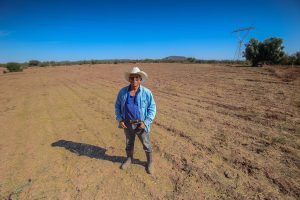
by Daliri Oropeza
“Now [the company] wants to negotiate again… but no more. Here they already started off on the wrong foot and its going to be more of the same, and they’re not getting in,” he says. And he states that neither this company nor any mining company will enter Yaqui territory.
“The company has to be paid because the pipeline is inactive. Well, you pay for it, not us. Who’s in charge? Now, you already knew what you were going to face. Tighten your belt and pay them. Who is forcing you to pay? There’s an international treaty, send them there over a pipe. Because if we start with those international treaties, tell the gringos to give back the territory they took, let’s see if they hold up. Oh right, they enforce them when it’s convenient. And we are not your subjects.”
Agroecological Planting
Guadalupe Flores has a mischievous smile, but his entire Yaqui demeanor is imposing. He enjoys walking through the agroecological garden created in Loma de Bácum, a few meters from the pipeline. In the distance, one can see the Ferromex train pass. Guadalupe explains that during the Porfiriato there was also repression for opposing the train. Later, it was used to deport them to Yucatán to be slaves on the agave plantations.
“We were born here, and we grew up here; these lands weren’t given to us by the Mexicans, nor by the Mexican government, nor by anyone. They were given to us by our divine belief that we are from here, and that is the difference, that is what we are defending.”
Currently, Guadalupe Flores organizes agroecological planting work, in which youth, women, men, and also elders participate.
“First we started planting up there [he points to the sacred Bakatete mountains] on about 500 hectares. It’s totally organic, it’s not contaminated, it’s good soil. And we’re starting here because it’s close to town, so that the youth here can come as well.
Agroecological planting has also worked to involve Yaqui children. They are brought to the territorial limits, the natural points that the entire Yaqui Nation recognizes as its territory, they are called linderos [boundaries]. According to Guadalupe, this has also served to strengthen their own identity.
“It’s useless to have a lot if we don’t know what to do with what we have. If this was given to us, left to use as a sacred inheritance, it is so that we can live and maintain ourselves from it,” explains Guadalupe.
This land they show us, with fig trees just beginning to sprout, the budding magueys from which they distill Bacanora, the dragon fruit, with a plot to grow vegetables in the cooler season, along with an irrigation line.
The land is so fertile, Guadalupe says, just toss a seed on it and it will grow. Now they’ve allied themselves with other Yaqui people who have been living in Arizona ever since their families were forced into exile during the Yaqui War.
For Guadalupe, agroecological planting is not a temporary or six-year project, but has “transgenerational” significance:
“We are thinking about those who have not yet been born. What are we going to leave to them? And they can’t defend themselves because they’re not here. But they will be, just as more than one hundred years ago those before us left this for us even though they didn’t know us. They fought for it and here we are.”
Yaqui women are very important for the transmission of language and ancestral traditions. The people see them as reservoirs of knowledge – from historical to medicinal – and of strength. In an interview in 2017, before her murder, anthropologist and ethnohistorian Raquel Padilla Ramos said that the loss of traditions and the Jiaki language is related to the fact that women no longer live communally but have to leave to work in the maquiladoras, and this has impacted family and social life among the people.
Guadalupe shares how his grandmother, a Yaqui woman, taught him the language, how to defend himself, and even how to fire a gun as a child.
In the agroecological garden of Loma de Bácum, there are figs, mug wort, grains, yucca, ragweed, citavaro, bacanora agave, saguaros. The majority of medicinal plants have been planted by women. They obtained solar panels to create a sprinkler irrigation system. Seasonally, vegetables such as cabbage, lettuce, beans, corn, and squash are planted.
“This is what the Yaqui Oath says, and it applies to all the Yaquis, all the Yaquis who were born here. We were born here, we are from here, and from that basis we govern ourselves, we put it into practice because it is a sacred duty of all Yaquis to defend their territory and to do it no matter the consequences, to the very end, to defend their lives because this is practically our life. They take our land, and they take that from us.”
